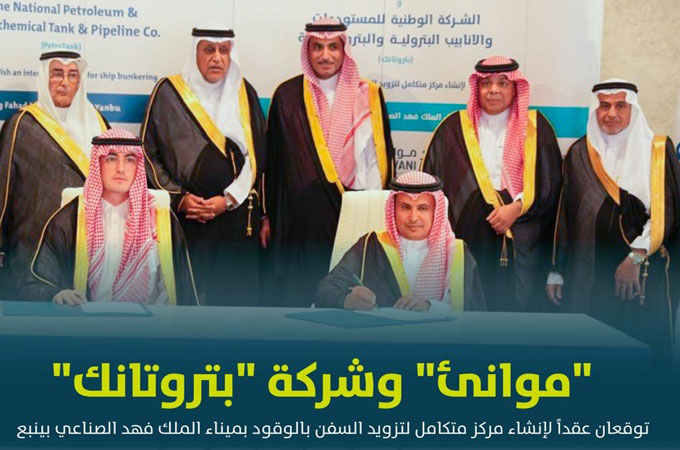The Saudi Ports Authority (Mawani) and the National Petroleum & Petrochemical Tank & Pipelines Company (Petrotank) have signed a land lease agreement to establish an integrated ship refueling centre at King Fahad Industrial Port in Yanbu.
The facility will be developed on a 110,700 sq m site with a total investment value of SAR500 million ($133.25 million) over a 20-year period, said a Saudi Press Agency report.
The agreement was signed by a number of officials from both sides.
The initiative is part of Mawani’s efforts to boost the competitiveness of Saudi ports. Fuel and oil tanks are a key component of providing high-value logistical services to vessels, supporting higher vessel traffic and enhancing regional and global port competitiveness. The project aligns with the objectives of the National Transport and Logistics Strategy to position the Kingdom as a leading global logistics hub, it said.
Mawani President Eng Suliman Almazroua stated: “This collaboration with Petrotank reflects Mawani’s commitment to enhancing the attractiveness and competitiveness of Saudi ports through the expansion of services provided to shipping lines.”
The new centre marks a significant step in the development of fuel storage and bunkering services, helping to attract more vessels, improve operational efficiency, and support the growth of commercial traffic—all in line with the goals of Saudi Vision 2030 to enable the logistics sector.
As part of the ongoing strategic partnership between Mawani and Petrotank, the company currently operates the fuel station at King Fahad Industrial Port in Yanbu, which includes eight tanks with a combined storage capacity of 114,000 cu m. The facility plays a vital role in supporting ship operations.
King Fahad Industrial Port in Yanbu is one of the kingdom’s primary industrial ports on the Red Sea coast. It is known for its high capacity to handle various types of cargo, including refined products and petrochemicals. The port spans an area of 6.8 sq km and features 34 berths and 10 terminals with a total handling capacity of up to 210 million tons.































